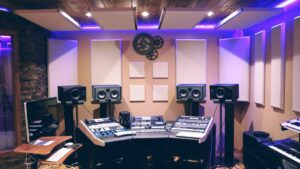In the ever-evolving world of music, technology has become a key player. It’s no longer just about natural talent and traditional instruments. Today, the music industry heavily relies on advanced technology, giving rise to a new generation of artists and producers. This is where music technology programs come into the picture.
Music technology programs are shaping the future of music, empowering artists with the tools they need to create, produce, and distribute music in innovative ways. Whether you’re an aspiring musician, a seasoned producer, or simply a music enthusiast, understanding these programs can open up a world of possibilities.
Join us as we delve into the fascinating realm of music technology programs, exploring how they’re revolutionizing the industry and changing the way we create and consume music.
Music Technology Programs
 The past century has witnessed profound changes in the field of music technology programs. Emergence of electrical and digital systems play a large part in this transition. From Thomas Edison’s invention of the phonograph in 1877, to the advent of the Moog synthesizer in 1964, advancements in technology have consistently remolded the landscape of music production.
The past century has witnessed profound changes in the field of music technology programs. Emergence of electrical and digital systems play a large part in this transition. From Thomas Edison’s invention of the phonograph in 1877, to the advent of the Moog synthesizer in 1964, advancements in technology have consistently remolded the landscape of music production.
In the 1980s, MIDI (Musical Instrument Digital Interface), a notable revolution, introduced a standardized method for electronic musical instruments to communicate with each other. Coupled with computer software, MIDI allowed for artists to experiment with a broad spectrum of sounds.
As technology continued to evolve, so did music tech programs, gradually leading to the digital era of the 21st century. This period brought a wave of digital music production software like Pro Tools, Garageband, and Ableton Live which enabled artists to create, edit, and distribute music from their personal computers.
Key Milestones in Development
 A look at key milestones in the development music technology programs underscores their transformative impact on the music industry. First, the utilization of electrical systems in the 1920s and 1930s, such as the theremin and the ondes Martenot, established the foundations of electronic music.
A look at key milestones in the development music technology programs underscores their transformative impact on the music industry. First, the utilization of electrical systems in the 1920s and 1930s, such as the theremin and the ondes Martenot, established the foundations of electronic music.
In the mid-20th century, the invention of multi-track recording allowed for more creative freedom in music production, which fueled the popularity of rock and pop genres. In the 70s and 80s, advancements such as the synthesizer and the Drum Machine substantially shaped modern pop culture and electronic dance music.
The advent of MIDI in the 1980s was another pivotal development, providing a reliable platform for electronic instruments and computers to interact. Lastly, the 21st century’s digital era, highlighted by the rise of Digital Audio Workstations (DAWs), democratized music production, making it accessible to a broader range of artists across the globe.
The music industry today continues to benefit from these revolutionary developments in music technology programs, with musicians and producers harnessing these tools to continually push the boundaries of creativity.
Core Components of Music Technology Programs
 Following the historic evolution of music technology, studying in this field requires a comprehensive understanding of various key elements. Across most music technology programs, integral parts include coursework and curriculum, integration of software and hardware, and practical experience and professional application.
Following the historic evolution of music technology, studying in this field requires a comprehensive understanding of various key elements. Across most music technology programs, integral parts include coursework and curriculum, integration of software and hardware, and practical experience and professional application.
Every good music technology program offers to their students a rich curriculum with subjects covering audio recording, music production, and enhancement using digital tools. Courses often cover topics including digital audio theory, acoustics, and practical music-making using technology. For instance, the curriculum at Berklee College of Music’s Electronic Production and Design department includes units on sound synthesis and sampling, music production for media, and live electronic performance; hence, trainees gain mastery over all facets of making and enhancing music.
Music technology isn’t solely about software mastery. A thorough understanding of hardware, and its integration with specific software, imparts a practical grasp of sounds, their creation, modulation and live manipulation. Performing in a Digital Audio Workstation (DAW) environment embraces both virtual and physical technology. DAWs, such as Ableton Live and Pro Tools, use physical hardware like MIDI controllers, drum machines and synthesizers in harmony with their digital components. Studies have shown that learning in such environments allows for high-index understanding and application of music technology.

